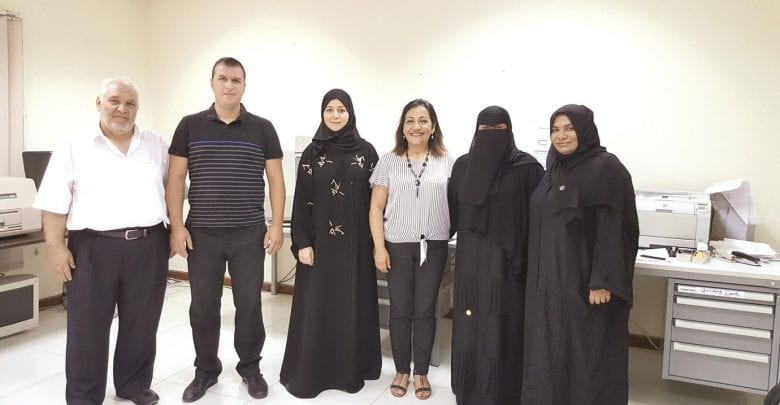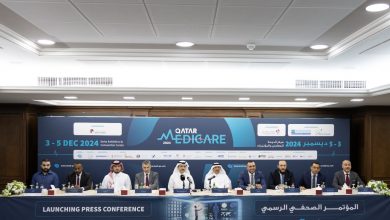
Qatar, Turkey to co-operate in radiation measurements field
تعاون قطري تركي في مجال القياسات الإشعاعية
QNA/Doha
Experts from the Turkish Atomic Energy Authority and the Department of Radiation and Chemicals Protection at the Ministry of Municipality and Environment (MME) are holding meetings in Doha to co-operate in radiometry and exchange of expertise in this field.
This comes within the framework of the ministry’s interest in developing and modernising its tools and control components in terms of human and technical development, in collaboration and co-ordination with the International Atomic Energy Agency (IAEA).
The visit of the Turkish experts to Doha and the holding of such meetings are one of the activities of Qatar national technical co-operation project with the IAEA for the establishment of the QAT6006 secondary dosimetry laboratory aimed at modernising and developing the radiation laboratory components of the Department of Radiation and Chemicals Protection and building human and technical capabilities. (Dosimetry is the accurate measurement of radiation).
The visit comes as part of the modernisation of the service of the secondary dosimetry laboratory, which is related to the assessment of the radiation exposure of workers in professions that involve exposure to radiation in Qatar, in addition to assisting in the establishment of the national monitoring register and the calibration of the system, and reviewing the work procedures and documenting them according to international standards.
The Manager of the Department of Radiation and Chemicals Protection Aishah Ahmad al-Baker explained that dosimeter measures the amount of radiation to which workers are exposed in the industrial, medical and research sectors in order to evaluate the exposure to radioactive doses during their work, pointing out that according to Qatari legislation, each worker in these sectors must carry his dosimeter at work, and the dosimeter shall be delivered every three months to the radiologist who will read and count the doses for this period and ensure that the readings do not exceed the limits allowed nationally and internationally.
Al-Baker pointed out that there are about 5,000 workers in all sectors of industrial, medical and research which involve exposure to radiation at the state level, and stressed that the biggest burden of radiation control of these workers falls on the unit of individual control in the laboratory radiation, asserting that the Department seeks to develop individual monitoring unit and provide the latest technology in this area, in accordance with international standards.
Al-Baker added that to that end, the Department was strengthening the radiological laboratory with new equipment that would meet the requirements for radiological work and also provide all necessary requirements, including the development and documentation of working procedures, in order to obtain accreditation.
Aishah Ahmad al-Baker hoped that the visit of the Turkish experts to Doha and their meetings with officials of the Department of Radiation and Chemicals Protection at the Ministry of Municipality and Environment would achieve the desired benefit and establish permanent co-operation with the Turkish side in the field of radiation measurements and exchange of experiences.
استضافت وزارة البلدية والبيئة ممثلة بإدارة الوقاية من الإشعاع والمواد الكيميائية أمس خبيرين من هيئة الطاقة الذرية بالجمهورية التركية، هما الدكتورة جيجدم يلدز مدير إدارة الفيزياء الصحية ومسؤولة قياس الجرعات الفردية، والسيد إرينك ريهانيولولو- مشرف جودة مختبر الجرعات القياسي الثانوي، وذلك في اطار اهتمامها بتطوير وتحديث أدواتها ومكوناتها الرقابية المتمثلة بتطوير الجانب البشري والتقني.
وتعد الزيارة أحد أنشطة المشروع الوطني للتعاون التقني بالتعاون مع الوكالة الدولية للطاقة الذرية IAEA والخاص بإنشاء مختبر قياس الجرعات الثانوي SSDL رقم QAT6006 والذي يهدف لتحديث وتطوير مكونات المختبر الإشعاعي وبناء القدرات البشرية والتقنية.
وتأتي هذه الزيارة ضمن تحديث خدمة وحدة قياس الجرعات الإشعاعية في المختبر الإشعاعي الواقع بمنطقة بوهامور والتابع لإدارة الوقاية من الإشعاع والمرتبطة بتقييم التعرض الإشعاعي لمختلف أنواع العاملين بالمهن الإشعاعية بالدولة بالإضافة إلى المساعدة في إنشاء سجل المراقبة الوطني ومعايرة النظام ومراجعة إجراءات العمل وتوثيقها حسب المعايير الدولية.
وقد استقبل الخبيرين كلا من السيدة عائشة أحمد الباكر مدير إدارة الوقاية من الإشعاع والمواد الكيميائية بوزارة البلدية والبيئة والسيد محمد حشري مشرف قياسات الجرعات الفردية وعدد من موظفات وحدة المراقبة الإشعاعية في المختبر الإشعاعي.
القياس الاشعاعي
وأوضحت السيدة عائشة الباكر أن مقياس الجرعة الإشعاعية (dosimeter) هو مقياس يقيس كمية الإشعاع التي يتعرض لها العاملون في العمل الإشعاعي بالقطاعات الصناعات والطبية والبحثية، بغرض إحصاء تقييم ما يتعرضون له خلال عملهم من كمية (جرعة) إشعاعية، حيث إنه وفقاً للتشريع القطري: على كل عامل إشعاعي في تلك القطاعات أن يحمل مقياس الجرعة الخاص به أثناء العمل، ويتم تسليم مقياس الجرعة (الفلم بادج) كل ٣ أشهر إلى المختبر الإشعاعي لتتم قراءته وإحصاء الجرعات التي تعرض لها العامل أثناء هذه الفترة، والتأكد من أن قراءته لا تتعدى الحدود المسموح بها وطنياً ودولياً وذلك حفاظا على صحتهم.
وأوضحت أنه يوجد ما يقارب 5000 عامل إشعاعي في كافة القطاعات الصناعية والطبية والبحثية على مستوى الدولة، وإن العبء الأكبر في المراقبة الإشعاعية لهؤلاء العاملين يقع على عاتق وحدة المراقبة الفردية في المختبر الإشعاعي، وأكدت أن الإدارة تسعى إلى تطوير وحدة المراقبة الفردية وتوفير أحدث التقنيات في هذا المجال تطبيقاً للمعايير الدولية، ومن أجل ذلك تقوم الإدارة بتعزيز المختبر بأجهزة جديدة تفي بمتطلبات العمل الإشعاعي وكذلك توفير جميع المتطلبات اللازمة بما فيها وضع إجراءات العمل وتوثيقها تمهيداً لحصول المختبر على الاعتماد.
وأعربت عن أملها بنجاح زيارة الخبراء وتحقيق الفائدة المرجوة منها، وتأسيس تعاون دائم مع الجانب التركي الشقيق وخاصة في مجال القياسات الإشعاعية وتبادل الخبرات في هذا المجال.



